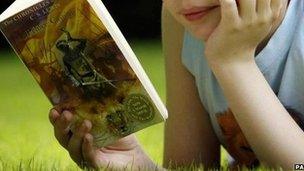Reading and writing catch-up classes for poorer pupils
- Published

Ministers want to narrow the attainment gap between disadvantaged pupils and their peers
Disadvantaged pupils, who are behind in reading and writing, are to be offered extra lessons before starting secondary school, ministers have announced.
Under the £10m scheme, poorer pupils in England who fail to reach Level 4 in English by the end of primary school will be given the chance to take part.
Last year, some 100,000 11-year-olds did not reach this level - the standard expected of the age group.
The first projects will start this September and the rest from next year.
Ministers said the move, which is being funded through the pupil premium - personal funding for disadvantaged children - is part of a bid to narrow the achievement gap with their richer classmates.
It follows concerns that some children can fall behind or struggle to make the transition between primary and secondary school.
Organisations such as schools, councils and charities are being asked to bid for funding to run the literacy catch-up classes.
Pupils who are eligible for free school meals (FSM) and looked-after children (those whose birth parents are unable to provide continuing care) will have access to the classes, the Department for Education said.
'Close the gulf'
Children's Minister Sarah Teather said: "Improving reading standards in schools is central to the coalition government's education reforms.
"Being able to read fluently by the end of primary school is essential. Without these skills children fall further behind in their education.
"This programme, funded by the pupil premium, will help struggling pupils catch up.
"It will also help close the gulf in achievement, where the poorest children are less likely to leave school with five good GCSEs than their less disadvantaged classmates."
The pupil premium, a key initiative for the coalition government, is given to pupils who are eligible for free school meals.
It is allocated to schools, and head teachers have the freedom to decide how it is spent.
'Wasted money'
Nansi Ellis, head of education policy at the Association of Teachers and Lecturers, said: "We are concerned that the government seems to be rather confused about whether the funding is intended to boost literacy or to support pupils' transition from primary to secondary school.
"While we are pleased the government says robust evidence will be used to decide which projects get funded, we are not happy about money being wasted on competitive bids.
"We hope the literacy catch-up programme for Year 6 and 7 pupils won't just be more synthetic phonics, because if it didn't help these children initially learn to read it is hard to see how it will when they are older.
"Of course, it's good that the government wants to help disadvantaged children, but it's a pity that the highly prescriptive new primary curriculum will give little space for teachers to use their professional skills to help disadvantaged children reach their potential."
- Published2 July 2012
- Published2 July 2012
- Published29 June 2012